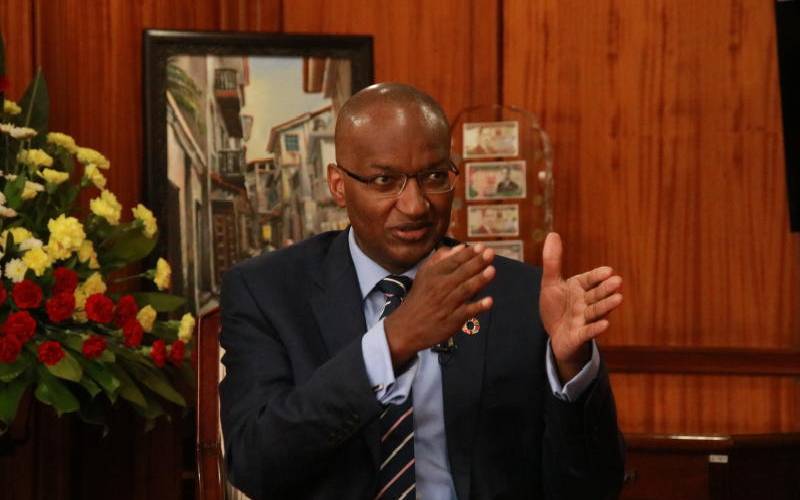
Central Bank of Kenya Governor Patrick Njoroge.
The Central Bank of Kenya (CBK) has for the first time admitted that the tax measures introduced in the Finance Act, 2021 will have far-reaching effects on the cost of living.
In a press briefing yesterday, CBK Governor Patrick Njoroge said the financial industry regulator’s calculation had shown that the tax measures and their indexation in the cost of living index, technically known as the Consumer Price Index (CPI), would push up the prices of items in the economy by 1.78 percentage points.
“If everything else was flat, meaning all other prices were not changing and the only change was due to these taxes and indexation, then inflation would be 1.78 percentage points,” said Dr Njoroge.
“That is the overall impact in terms of those measures,” said Njoroge in his post-Monetary Policy Committee (MPC) briefing in his office.
Inflation, or the overall increase in prices of goods and services, has edged up, hitting a 16-month high of 6.32 per cent in June.
This has triggered an outcry among Kenyans, whose purchasing power has already been eroded by the adverse effects of the Covid-19 pandemic.
This even as prices of items such as cooking oil, petrol, and food items go through the roof.
With most of the tax measures taking effect in July, it appears like inflation might surpass the June figure. Although this is still within the CBK target of between 2.5 per cent and 7.5 per cent, it is likely to spill out due to poor rains in the months of July, August and September.
The government has also predicted a drought towards the end of the year.
Some of the items that were affected by the new taxes include telephone and internet services, whose excise duty was increased from 15 per cent to 20 per cent.
Cooking gas will also start attracting 16 per cent value-added tax (VAT) after some delay.
The cost of loans has also started going up after President Uhuru Kenyatta assented to the Finance Bill, 2021, which introduced excise duty on all fees and commissions related to loans.
But even before the new tax measures, the prices of food and fuel had gone up, with the price of cooking oil rising sharply by 32 per cent in the one year to June, beef with bones (21.6 per cent), white bread (20.1 per cent), and wheat flour (8.6 per cent).
The increase, said Njoroge, was largely on imported items following supply disruptions due to the negative effects of the Covid-19 pandemic affecting the production of wheat and palm oil, a key ingredient in the manufacture of cooking oil.
Poor supply has pushed up the prices for these inputs, which has translated into higher prices in the final products.
On wheat, the CBK boss said harvests from wheat-growing areas like Narok will soon be hitting the market thus bringing the prices of the grain and bread down.
He also noted that month on month, the increase has been on seasonal items, such as sukuma wiki (kales), whose supply picks up with little precipitation and as lack of rainfall dampens their harvest.
Another item that contributed to the increase in the cost of living was fuel, with the cost of petrol, paraffin and diesel rising sharply over the 12-month period to June.
This was due to changes in the global prices of crude oil following an upsurge in economic activities around the world as economies began to reopen after a period of self-imposed lockdowns to combat the Covid-19 pandemic.
Njoroge noted that if you strip out items that are subject to volatile prices, like food and energy, core inflation remained stable at 2.6 per cent.
“There may be other seasonal factors that have driven up prices of food and hence you get the “sticker shock” at the end of the month.”




No comments :
Post a Comment